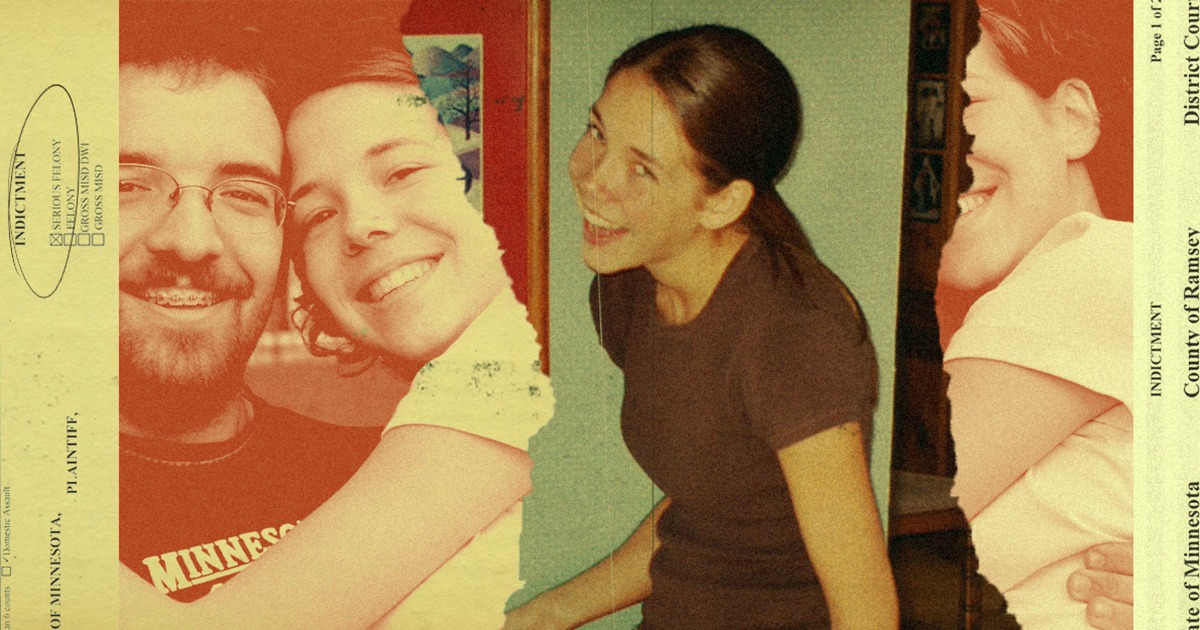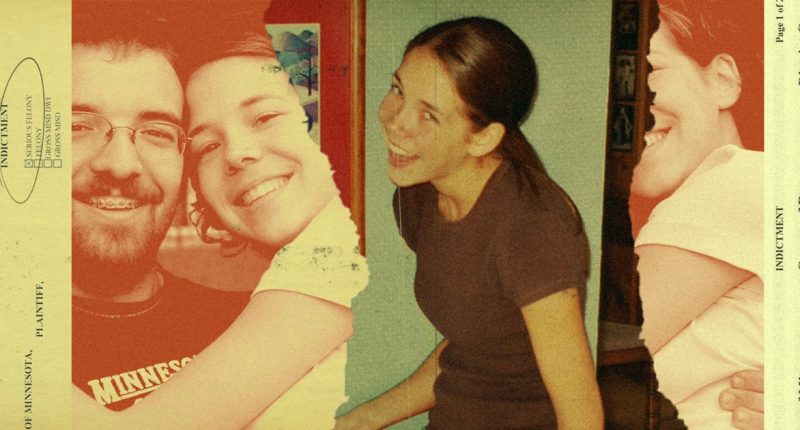
For Pete Erickson, the news was awful and confusing: Early one Sunday, an intruder broke into his sister’s suburban Minnesota home. There was a struggle. She was shot and killed.
In the days that followed Heidi Firkus’ killing more than a decade ago, that shock turned to suspicion when her husband, Nick, disclosed an alarming fact: The couple’s home had been foreclosed on, and Heidi had long known about it, he said — even though she’d never once mentioned their financial troubles to her family.
“That was the turning point, for sure, in terms of what part of the story makes sense and what part does not,” Pete Erickson told NBC’s “Dateline” in his first interview about the case since the shooting April 25, 2010.
“I know my sister,” Erickson said, recalling his disbelief that she wouldn’t have shared such an important event with her family. “There’s just no way that could have been true.”
For more about the mystery surrounding Heidi Firkus’ death, tune into “65 seconds on “Dateline” at 9 ET/8 CT tonight.
Nick Firkus was sentenced in April to life in prison for his wife’s murder. He said his family had grappled with the unthinkable: A man with whom they had shared intimate moments — a wedding, holidays — was convicted of perpetrating an elaborate deception that ended in murder.
A foreclosure and a staged break-in
According to prosecutors, there was no intruder. Nick Firkus fabricated the story after he shot his wife in the back with a double-barrel shotgun and wounded himself with a blast to the thigh.
Firkus has rejected that account. “I do maintain, and I will maintain to my dying breath, my innocence of this crime,” he said at his sentencing.
At his trial, prosecutors presented the foreclosure as a central motive. He was so ashamed, assistant Ramsey County prosecutor Elizabeth Lamin told jurors, that he kept it a secret from everyone, including his wife. But as reality came “crashing down” — their eviction was scheduled for the day after the shooting — Nick Firkus staged a burglary and pulled the trigger, Lamin told jurors in her opening statement.
Lamin told “Dateline” the foreclosure would have revealed who Firkus really was — a man who held himself out to be accomplished, capable and church-going but was actually the “quiet guy in the corner” who had squandered the couple’s money and lost their home.
Another prosecutor in the case, Rachel Kraker, said: “To be exposed in that way, it just couldn’t happen.
“If he was going to lose Heidi, he was going to lose everything,” she said.
Did she know?
The couple met at church when she was a freshman in high school and he was a junior. They married in 2005. He worked for his father’s carpet cleaning business; she worked entry-level jobs and eventually landed a position at Securian, a financial services company.
“There wasn’t any reason to think that this wasn’t a good match,” Erickson said.
They bought their home in 2007, at the height of the financial bubble, but were quickly underwater, Lamin said in the prosecution’s opening statement. By the end of 2008, after the couple took out two mortgages, the bank began sending foreclosure notices. The home was sold at a sheriff’s auction the next summer.
One of Nick Firkus’ lawyers, Joe Friedberg, told “Dateline” that it was impossible for Heidi’s family to know what she knew — or didn’t know — about the foreclosure. But the evidence was “overwhelming” that she was aware of it, he said.
“She would’ve had to be a stupid or naive woman if she didn’t know, ’cause the house was filled with documents that would’ve told anybody,” Friedberg said.
Another lawyer, Robert Richman, said there was no deception by Nick Firkus: “There is no evidence that he was hiding this from Heidi. And if he wasn’t actively hiding it from her, it would have been impossible for her not to know.”
His situation didn’t improve after Heidi’s death, Richman added.
“It did not cause an influx of cash to Nick,” he said. “It did not prevent the foreclosure. He still had to move out of his house, but now, he didn’t have his life partner to do it with.”
Niki Sipes, the detective who investigated the killing for the St. Paul Police Department, said the evidence supported a different conclusion. She told “Dateline” that she examined the couple’s emails and texts and found no communication related to the foreclosure or moving, to a storage unit or to figuring out where they would sleep the following night.
“I was looking for something as small as ‘Can you grab some tape and black markers?'” Sipes said. “We were looking for even these tiniest little of clues to say, well, did she know something was up? And we just couldn’t find them.”
Sipes also interviewed the lawyers who handled the foreclosure and the eviction, and neither discussed the matter with Heidi, Sipes said.
Only one of the couple — Nick Firkus — attended a court hearing for the eviction roughly a month and a half before the killing. The detail stayed with the couple’s lawyer, Sipes said, because during the hearing, Nick Firkus signed a property release saying anything left behind could be thrown out or destroyed.
“The attorney took a pause on that, like, oh, I hope the wife doesn’t come back and say, ‘Well, I didn’t sign this,'” Sipes recalled the lawyer saying.
Doubts creep in
Erickson said Heidi had trusted her husband to manage their finances and had no input on the matter — a view authorities said was supported in their search of the couple’s communications. It was clear that Heidi knew something was wrong with the couple’s finances, Sipes said, “but we could also see her asking him to take care of it over and over.”
Erickson attributed his sister’s distance from the issue to a division of labor that often happens among couples. He handled the finances; she did the hosting and organizing, Erickson said.
And she just wasn’t “wired” to hide something as important as a foreclosure or an eviction from her family, her brother said.
“We’ve never had any reason to withhold hard stuff from our parents,” he said. “She’s not one to carry that kind of thing on her own.”
Erickson learned about the foreclosure in the news shortly after her sister’s murder. He described the detail as a gut punch — a revelation that left him even more shaken and traumatized.
As Erickson came to doubt his brother-in-law’s account of Heidi’s death — and began to suspect that he was responsible for it — their relationship deteriorated. It was fully severed when, in 2012, Firkus remarried, vowing to spend the rest of his life with the sister of a close friend of Heidi’s.
At the same time, the investigation into the killing languished. Authorities briefly investigated a man who matched the description of the intruder Nick Firkus provided to police, but the lead stalled when investigators determined he was in jail at the time of the killing.
Erickson said that whenever he had an “open space” in his mind — when he was mowing the lawn, for instance — he’d find himself dwelling on his sister’s killing.
“My thoughts would always turn to what happened to Heidi and the frustration of knowing that it had been carried out by Nick and that he was able to continue his life and the injustice of that,” he said. “Those thoughts would just play over and over in my head again in those moments.”
New wife, new foreclosure
Nick Firkus’ arrest 11 years after Heidi’s killing was assisted by an unusual ally — his second wife, Rachel Firkus.
After Nick Firkus told his second wife a series of “white lies,” she uncovered something dramatic: a letter hidden in his sock drawer showing that their home was facing foreclosure over a missed property tax payment, she told “Dateline.”
Alarmed, she confronted her husband about it — and about whether Heidi had known about their foreclosure — in conversations she secretly recorded and provided to authorities.
“I didn’t want to be silent,” she told “Dateline.”
Nick Firkus’ lawyers dismissed her anxiety as overblown and said Rachel Firkus had made “mountains of molehills.” A judge barred prosecutors from introducing her testimony at trial, saying it would be too prejudicial for the jury.
Still, said Lamin, the assistant prosecutor, Rachel Firkus was a key witness for the grand jury that indicted Nick Firkus on a second-degree murder charge, later upgraded to first-degree. She also provided prosecutors with a “moral push,” Lamin said.
Erickson, too, found her “bravery” remarkable, saying he couldn’t imagine the stress she must have been feeling.
When Nick Firkus was arrested that May, Erickson found himself entertaining an unfamiliar thought — his family might get answers, he said.
And when Firkus was convicted two years later, Erickson said, his family finally felt something they’d been longing for: “a shared sense of relief.”
Source: | This article originally belongs to Nbcnews.com










